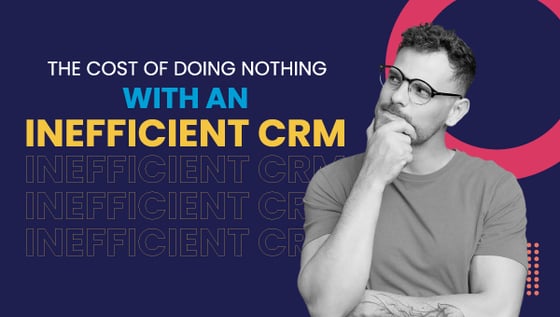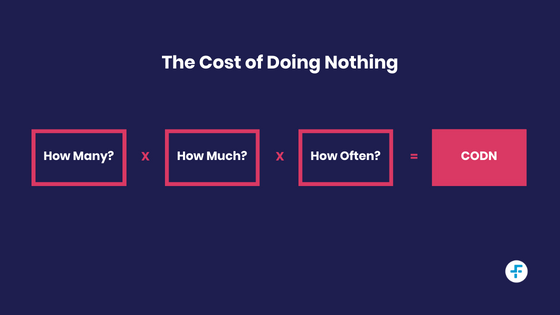


CRM Problems: The Cost of Doing Nothing with an Inefficient CRM




Your customer relationship management (CRM) system is the beating heart of your customer experience. However, in various cases of not leveraging a CRM Consultant to implement your CRM, you might end up with a piece of tech that does more harm than good.
Legacy tech can be expensive to maintain and may not be able to keep up with the ever-changing needs of your customers. With an inefficient CRM, you risk losing out on potential customers, while also wasting valuable time and money. It's time to take a hard look at the cost of doing nothing with an outdated, inefficient CRM.
What is the Cost of Doing Nothing?
The concept of the Cost of Doing Nothing (CODN) is a framework that empowers businesses to assess the potential losses, be it in terms of time or money, resulting from stagnation or inaction.
Cost Of Doing Nothing Formula
To calculate the formula for the cost of doing nothing, businesses should evaluate the following factors
Factors to Consider:
- How Many: This factor examines the number of people affected.
- How Much: This factor pertains to the length of time or number of activities involved.
- How Often: This factor relates to the timeframe under consideration.
The formula then begins How Many X How Much X How Often = CODN

Evaluating Your Tech Stack for CRM Problems
Ignoring your CRM problems can result in a decline in operational efficiency, a drop in customer satisfaction, and a loss of competitive advantage.
In the fast-paced digital era, a "wait and see" approach can be costly. While it might seem convenient to postpone changes due to perceived disruption or the fear of migration challenges, the lag can cause your business to fall behind in the race. The longer you wait, the larger the gap becomes between your current CRM and the advanced solutions available in the market, making the eventual transition even harder.
Besides the direct financial implications, there are intangible costs like missed opportunities, reduced productivity, and a weakened market position.
Understanding the Financial Impact of CRM Problems
What many business leaders fail to realise is that the cost of doing nothing with an outdated system should be a factor when evaluating your tech stack. Legacy tech is expensive to maintain and can cause a lot of frustration for your team. You’ll find yourself dealing with compatibility issues, slow performance, and a lack of features that could help you better serve your customers. The cost of these issues can add up quickly, resulting in lost time, lost customers, and lost revenue.
Example of Cost of Doing Nothing in Prospecting
Consider a scenario where your business's prospecting goals are hampered due to inability to segment and prioritise leads in an efficient CRM system. Here, the Cost of Doing Nothing might be more significant than you realise.
Without an efficient CRM system, you may not be able to target the right customers with personalised deals and offers. The outdated CRM would also mean a lack of coherent customer data, making it hard to prioritise prospects based on their potential value to your business.
Let's say, for instance, your sales team of 5 each spends approximately 1 Hr per Day trying to manually segment leads, instead of focusing on engaging high-value prospects.
5 Sales People (How many) X 1 Hrs (How Much) X 7 Days (How Often) = 35 hours per week
That's 35 hours a week that your sales team is spending manually segmenting their data rather than prospecting.
Image if you could deliver even 2-4 more demos during a week. What monetary value would that bring to your team?
Example of Cost of Doing Nothing in Sending Quotes
Let's consider another example where your business's quotation process is impeded due to manual processes in your legacy CRM system. The Cost of Doing Nothing here again could be surprisingly high.
With an outdated CRM, preparing and sending out quotes or emails may be a cumbersome process. Your sales team might have to manually gather data, prepare the quote, and then send it to the prospective customer. This inefficient process could lead to delays, creating a negative impression and potentially losing the customer to a competitor.
Let's assume in your organisation, it takes approximately 2 hours for a member of your sales team to prepare and send out a quote. If you have a team of 5 and each one sends out 3 quotes per day,
5 Sales People (How Many) X 2 Hrs (How Much) X 3 Quotes (How Often) = 30 hours per day
This amounts to 150 hours per week spent solely on preparing and sending quotes. This time could be significantly reduced with an efficient CRM, freeing up your team to focus more on customer engagement and other high-value tasks.
Example of Cost of Doing Nothing in Preparing Sales Notes
Let's explore another scenario where the Cost of Doing Nothing becomes apparent in the context of preparing sales notes in your outdated CRM system.
If your sales team is spending excessive time inputting data into the CRM, they have less time available to conduct product demos. This inefficient use of time could directly impact the number of potential customers your team can reach, and subsequently, your business's bottom line.
Suppose your sales team of 5 spends an average of 3 hours per day inputting data into the CRM, reducing the time available for conducting demos.
5 Sales People (How Many) X 3 Hrs (How Much) X 1 Day (How Often) = 15 hours per day
This translates to 75 hours per week of potential demo time lost to CRM data input. An efficient CRM could streamline this process and allow your team to maximise their time conducting demos, leading to more potential sales and increased revenue.
Example of Cost of Doing Nothing in Data Management
Let's delve into another example where the Cost of Doing Nothing becomes glaringly apparent - data management in an outdated CRM system.
Your marketing team, instead of creating effective marketing strategies and campaigns, might be spending a substantial chunk of their time correcting and compiling data due to improper integration of your CRM. This inefficient use of time can slow down marketing efforts and undermine the overall effectiveness of your campaigns.
Assume your marketing team of 4 spends an average of 2 hours per day on correcting and compiling data.
4 Marketing Team Members (How Many) X 2 Hrs (How Much) X 1 Day (How Often) = 8 hours per day
This translates to 40 hours per week that your marketing team spends on managing data, which could be drastically reduced with a more efficient CRM and the correct integrations in place. This saved time can be redirected towards strategising and implementing more effective marketing campaigns, resulting in better customer engagement and potentially increased sales.
From Inaction to Action: Embracing CRM Transformation
As we've explored, clinging to an outdated system with CRM problems can bleed your business dry. The costs, both obvious and hidden, accumulate over time, hindering growth and frustrating your team. But what if we flipped the script? What benefits could you unlock by embracing a modern, efficient CRM? Let's delve into the advantages of upgrading and how it can transform your business.
Unveiling the Potential: The Advantages of a Modern CRM
Investing in a robust CRM solution isn't just about avoiding losses; it's about actively pursuing gains. The advantages of CRM extend far beyond simple data storage. A well-implemented CRM can revolutionise your sales, marketing, and customer service efforts, leading to increased revenue and stronger customer relationships.
Streamlining Marketing Efforts with Automation
One of the key areas where an efficient CRM shines is in its ability to integrate with marketing automation tools. Imagine seamlessly nurturing leads with personalised content, automatically scoring their engagement, and handing them off to sales at the perfect moment. This level of integration ensures that your marketing and sales teams are working in perfect harmony, maximising conversion rates and driving revenue growth.
Elevating the CRM Experience
But simply having a CRM isn't enough. You need a platform that's intuitive, user-friendly, and tailored to your specific business needs. That's where focusing on the crm experience becomes crucial. A CRM that's easy to adopt and use will empower your teams to work more efficiently, collaborate more effectively, and deliver exceptional customer service.
Essential CRM System Functionalities
To achieve these benefits, it's important to consider the CRM system functionalities that are non-negotiable for your business. From contact management and pipeline management to automation and reporting, these core features are essential for driving efficiency, improving customer engagement, and achieving your business goals.
Building a Winning CRM Strategy
Finally, to truly unlock the potential of your CRM, you need a well-defined CRM Strategy. This involves auditing your current processes, setting clear goals, identifying your ideal customer profile, mapping the customer journey, and ensuring that your CRM integrates seamlessly with your existing tech stack.
By strategically implementing these key elements, you can transform your CRM from a simple database into a powerful engine for growth, driving revenue, improving customer satisfaction, and gaining a competitive edge in today's dynamic market.







